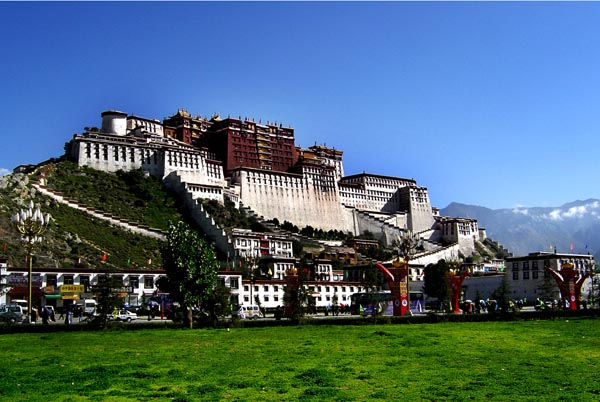China's power shortage brings long, cold days to Lhasa
The biggest cinema in downtown Lhasa was packed with an audience eager to enjoy Avatar, the year's first blockbuster in China, on Thursday evening.
 |
|
The Potala Palace in Lhasa [File Photo] |
But 30 minutes into the James Cameron epic, the screen went black.
"Power cut again," Losang Tsering sighed in disappointment. He had the same experience when he was watching the Hong Kong all-star action film "Bodyguards and Assassins" two weeks earlier.
As the crowd reluctantly felt their way to the exit, Jiang Wu, a security guard at Xinhua's Lhasa bureau five minutes walk away, expertly started a diesel generator.
"Don't turn on the air-conditioner," he shouted at several office windows that were lit up again. The night temperature had dropped to minus 8 degrees Celsius in Lhasa.
Most residents, however, have been used to such blackouts since winter began in October.
The Tibet Electric Power Company in Lhasa forecast a demand of 1.1 billion kilowatt-hours from November last year to May in southwest China's Tibet Autonomous Region, but the maximum capacity of the local grid is 800 million kilowatt-hours.
Company sources say the power shortage had affected about 800,000 of Tibet's 2.87 million people.
Quotas have been capped on households, while businesses and factories are taking turns to shut down production lines for a day or two every week in order to cut electricity consumption. Still, downtown communities are occasionally blacked out.
Tangyeling Community in Lhasa's old city center had its fourth blackout of the week Thursday night.
"Frequent power cuts have at least doubled candle prices," says Dawa, a resident of the community. A candle that sold for 0.5 yuan in the summer now sells for 1 yuan. "Some stores even charge 2 yuan, and we need at least two candles a night."
Life is particularly quiet on the cold and long winter nights in Tibet, which, like all of China, runs on Beijing time, but its workday starts and ends later to reflect the actual time differences.
Without electricity, Dawa is unable to watch TV. On Thursday night, he almost failed to get his daily dose of yak butter tea. "Fortunately, my wife prepared a full kettle in the afternoon," he says.
The family uses an electric tea maker, similar to a coffee machine.
Dawa and his wife, like most other families in the community, huddle for hours around a dung-fueled stove before going to bed.
Power shortages are a nationwide issue in China nearly every winter. The cold snap seizing most of China since late December has made the situation worse this year.
Central and eastern provinces have reported shortages of power-generation coal and some cities have restricted power supplies, according to the State Grid Corporation of China (SGCC), the leading power grid operator.
In Wuhan, capital of the central Hubei Province, a power crunch since mid December has forced nearly 2,000 factories to suspend production to ensure adequate power supplies for local families.
In Harbin, capital of the northeastern Heilongjiang Province, one of the coldest Chinese regions, heating has been a problem for many people: students all wrap themselves up in heavy down coats in classrooms, and the indoor temperature in homes rarely tops 10 degrees Celsius.
 0 Comments
0 Comments






